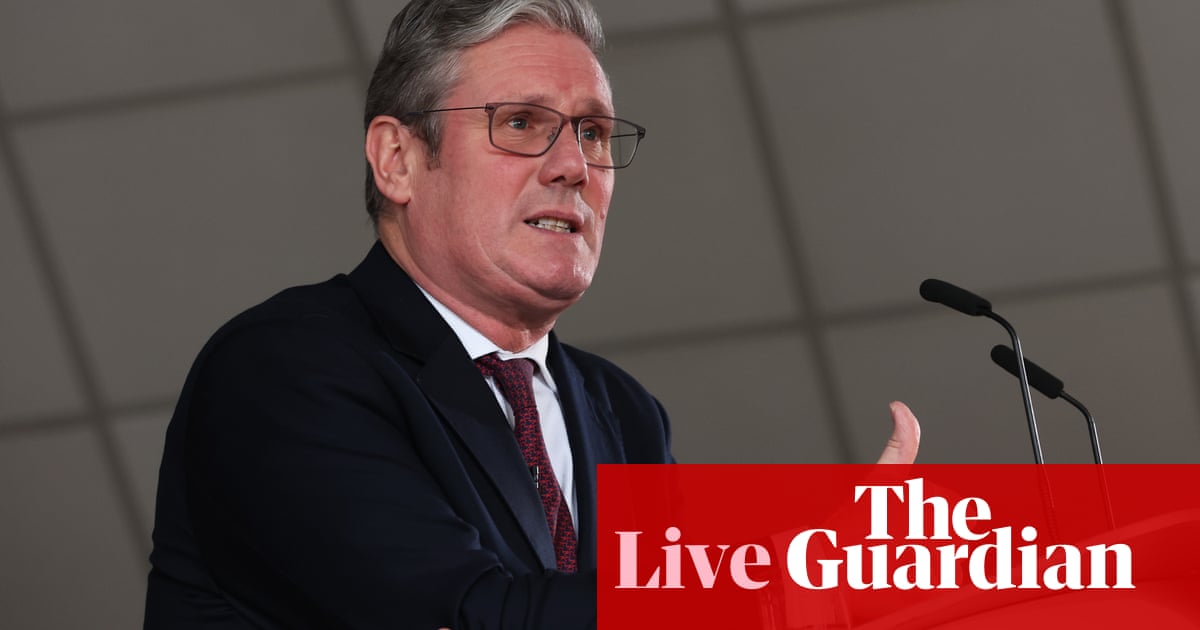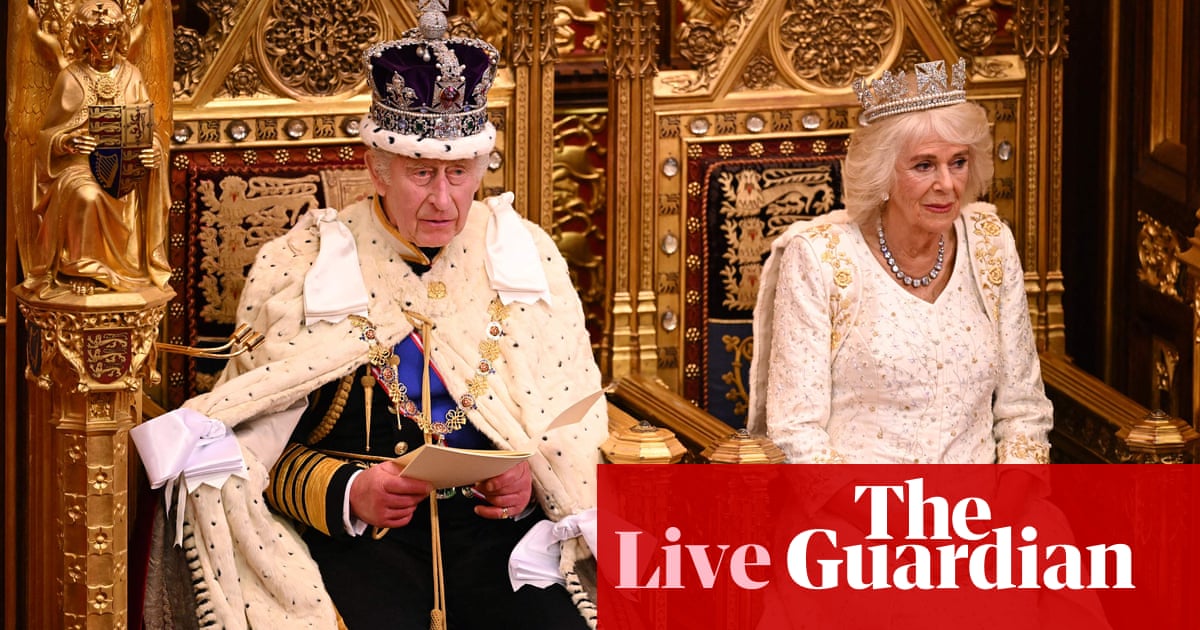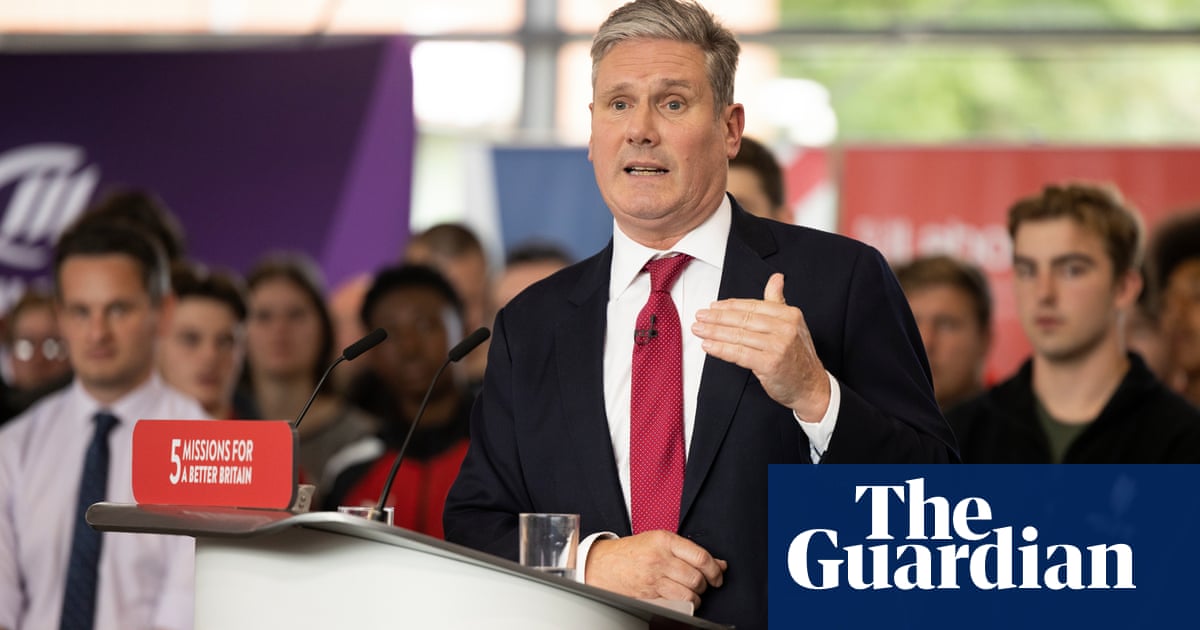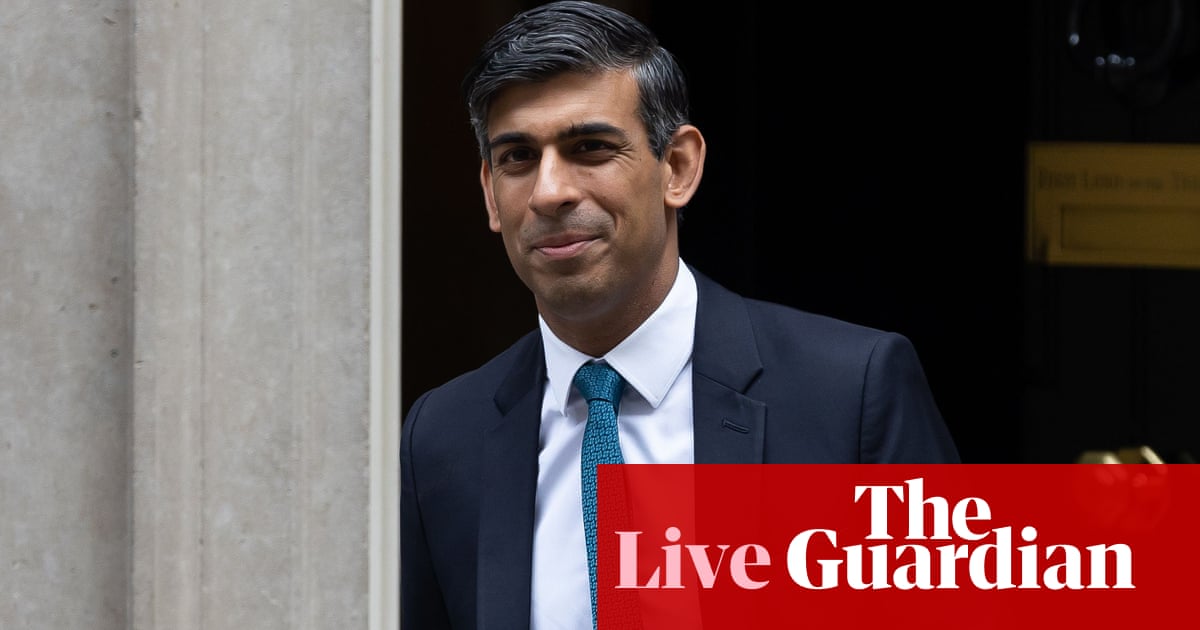
Keir Starmer says he wants relationship with China while "being clear about issues we do not agree on"
Keir Starmer has said that he wants a “serious and pragmatic” relationship with China while “being clear about the issues that we do not agree on”.
Speaking to broadcasters after his meeting with Chinese president Xi Jinping on Monday, the prime minister said: “I’ve been clear that I want a serious and pragmatic relationship with China.
“It’s the second biggest economy in the world, it’s one of our biggest trading partners, and therefore we have issues that we clearly need to discuss.
“Whilst, of course, being clear about the issues that we do not agree on.
“But I will always act in the national interest, and that was the basis upon which we had our discussions this morning.”
Closing summary
Keir Starmer has said that he wants a “serious and pragmatic” relationship with China while “being clear about the issues that we do not agree on”. Speaking to broadcasters after his meeting with Chinese president Xi Jinping on Monday, the prime minister said: “I’ve been clear that I want a serious and pragmatic relationship with China. It’s the second biggest economy in the world, it’s one of our biggest trading partners, and therefore we have issues that we clearly need to discuss.”
China’s president, Xi Jinping, has heaped praise on Keir Starmer’s economic policy, as the UK prime minister used their first meeting to raise concerns about sanctions on MPs and the treatment of the pro-democracy campaigner Jimmy Lai. In conversation at the G20 summit in Rio, the first meeting between the UK and China’s leaders in six years, Starmer said he would be keen to host a full bilateral meeting with Xi and the Chinese premier, Li Qiang, in Beijing or London as soon as possible, aimed at turning the page on frosty UK-China relations.
Meanwhile, Starmer has said there is “lots to discuss in our mutual interests as we go forward” as he met Australian prime minister Anthony Albanese at the G20. At the top of a bilateral meeting with the Australian premier, Albanese said that Australia and the UK “are “great friends, on security, on climate policy on our engagement.”
National Farmers’ Union president Tom Bradshaw said planned demonstrations are “definitely going ahead” after he met with Environment Secretary Steve Reed in parliament on Monday evening, PA Media reported. Speaking outside parliament, Mr Bradshaw told the PA news agency: “The planned demonstrations are definitely going ahead. It was a valuable meeting. It was a great opportunity to really spell out in black and white why their evidence is wrong, why it has to come forwards in consultation, and what the extreme human pressure is that this policy has created.
Starmer has said that he understands changes to inheritance tax are “causing concern” for farmers but insisted “the vast majority of farms” will not be affected. Speaking to broadcasters at the G20 summit in Brazil on Monday, the prime minister said he is supporting farmers with money at the budget “alongside money to do with flooding and to do with the outbreak of disease.”
Bridget Phillipson, the education secretary, has said she is likely to vote against the bill to legalise assisted dying, as Keir Starmer issued a veiled warning to cabinet ministers, such as Wes Streeting, to stay neutral on the issue. Starmer, speaking to reporters en route to the G20 summit in Brazil, confirmed for the first time that he would vote on the assisted dying bill later this month, but indicated he would not reveal his position in advance.
Tax rises in the budget have sapped consumer confidence and will lead to sharp reductions in private sector pay growth next year, two separate reports have said. In a blow to Rachel Reeves’s efforts to boost growth, a survey by S&P Global Market Intelligence showed that consumer confidence dropped this month after households said the outlook for the economy had deteriorated and the prospects for their own finances had worsened.
More than one in three children and a quarter of adults are living in poverty in the UK as deprivation levels rise to the highest in the 21st century, according to a landmark report. The study by the Social Metrics Commission (SMC), which uses measures recently adopted by the UK government, found the cost of living crisis had plunged 2 million more people into severe hardship since 2019.
That’s all from me, Tom Ambrose, and the UK politics live blog for today. Thanks for following along.
Planned demonstrations "definitely going ahead", says NFU president
National Farmers’ Union president Tom Bradshaw said planned demonstrations are “definitely going ahead” after he met with Environment Secretary Steve Reed in parliament on Monday evening, PA Media reported.
Speaking outside parliament, Mr Bradshaw told the PA news agency: “The planned demonstrations are definitely going ahead.
“It was a valuable meeting. It was a great opportunity to really spell out in black and white why their evidence is wrong, why it has to come forwards in consultation, and what the extreme human pressure is that this policy has created.
“We have to have these conversations, but we’re really concerned that at the moment, there doesn’t seem to be any action. There doesn’t seem to be any understanding from the Treasury of what they’re doing.”
Bradshaw said he was “debating the data” with the environment secretary during their meeting.
He added: “The whole focus was on this abhorrent policy that’s been put in place. We think it’s a very ill considered policy. I don’t believe that they intended the human consequences that there are within the policy they’ve put forwards.
“I don’t think they understand that family farms that are producing this country’s food are right in the eye of this storm.”
Shadow transport secretary Gareth Bacon said raising the bus fare cap to £3 was “not an inevitability”.
He said: “The government seems at a loss as to why its policies are so unpopular and why, only a few months into this government, they are so deeply distrusted by the British public. Governing is tough and it requires taking real responsibility and considering the consequences of the decisions before you take them.
“For example, the decision to increase the bus fare cap from £2 to £3. This will cost users more and perversely, will put at risk passenger services on certain routes, because it could counterproductively drive bus ridership down.”
Meanwhile, Keir Starmer has said there is “lots to discuss in our mutual interests as we go forward” as he met Australian prime minister Anthony Albanese at the G20.
At the top of a bilateral meeting with the Australian premier, Albanese said that Australia and the UK “are “great friends, on security, on climate policy on our engagement.”
Starmer replied by saying “we can double down on that”.
Reform to bus services that will allow local authorities to adopt franchising models is “the biggest shake up of the sector for 40 years”, transport secretary Louise Haigh has said.
She told MPs: “We have called time on the way bus funding has historically been allocated. Previously, the government made councils compete for funding, wasting resources and delaying decisions. It was overly complicated, led to inconsistent funding and created uncertainty for authorities and operators.
“We are taking a fundamentally different approach. We have allocated funding based on local need, population, the distance buses travel and levels of deprivation. This puts fairness at the heart of future funding, and ends the postcode Lottery on bus services. It ensures taxpayer money goes to the areas in most need, where it will have the most impact and where passengers will most benefit.
“This is the first stop on our journey to support local areas to take back control of services and deliver better buses across the country. Finally, we will introduce our landmark buses bill in the coming weeks. It is the biggest shake up of the sector for 40 years.
“It will allow councils across the country to adopt franchising models, as in Greater Manchester and London. That means local leaders taking back control of services, ensuring routes, fares and timetables are all geared towards local passenger needs.”
Keir Starmer has said that he understands changes to inheritance tax are “causing concern” for farmers but insisted “the vast majority of farms” will not be affected.
Speaking to broadcasters at the G20 summit in Brazil on Monday, the prime minister said he is supporting farmers with money at the budget “alongside money to do with flooding and to do with the outbreak of disease.”
He went on: “On the question inheritance tax, look I do understand that it’s causing concern.
“But if you take a typical case of a couple wanting to pass a family farm down to one of their children, which would be a very typical example, with all of the thresholds in place, that’s £3m before any inheritance tax is paid.
“And that’s why I’m confident that the vast majority of farms and farmers will not be affected at all by that aspect of the budget.
“They will be affected by the £5bn that we’re putting into farming, and I’m very happy to work with farmers on that.”
Keir Starmer says he wants relationship with China while "being clear about issues we do not agree on"
Keir Starmer has said that he wants a “serious and pragmatic” relationship with China while “being clear about the issues that we do not agree on”.
Speaking to broadcasters after his meeting with Chinese president Xi Jinping on Monday, the prime minister said: “I’ve been clear that I want a serious and pragmatic relationship with China.
“It’s the second biggest economy in the world, it’s one of our biggest trading partners, and therefore we have issues that we clearly need to discuss.
“Whilst, of course, being clear about the issues that we do not agree on.
“But I will always act in the national interest, and that was the basis upon which we had our discussions this morning.”
County councils strongly welcome government"s plans to curb costs of private child social care homes
The County Councils Network, which represents England’s largest care authorities, has strongly welcomed Bridget Phillipson’s plans to overhaul children’s social care. (See 4.34pm.) In a statement Roger Gough, the Conservative leader of Kent county council and the CCN’s spokesperson for children’s services, said:
The CCN strongly welcomes the government’s intention to reform children’s social care. Over a number of years our organisation has highlighted the need for the system to address market dysfunction, rebalance the system towards early help rather than late intervention, and – most importantly – improve the experiences and outcomes of the country’s most vulnerable children and families in contact with the care system.
The government’s intention to intervene more proactively in the children’s social care placement market is particularly important. Our recent analysis showed that, unchecked, councils could be spending £12bn a year on children in care by 2030, with local authorities having to operate in a false economy of increasingly paying astronomical sums for placements and less on preventative services. Whilst it is recognised the private sector is an important partner in delivering these goals, the clear signal that excess profiteering at the expense of threadbare local authority budgets will not be tolerated is necessary and long overdue.
That is all from me for today. Tom Ambrose is now taking over.
Transport secretary Louise Haigh tells MPs some areas getting record investment in buses under DfT plans
Louise Haigh, the transport secretary, is making a statement to MPs about funding for bus services. She says the Department for Transport is today explaining how the £1bn for buses announced in the budget is being allocated in England. She goes on:
Today, we distributing that funding. That means over £700m pounds for local councils to deliver bus service improvement plans and better meet local needs, and a further £243m pounds to bus operators, including funding a longstanding grant to drive down fares and drive up services.
In many places, this is record investment and every region, every authority in England will benefit, especially those areas historically underserved, like rural areas and small towns.
Councils such as Leicester, the Isle of Wight, Torbay and Cambridgeshire will see unprecedented levels of funding for services.
At risk routes will be saved and passengers will see faster, more reliable journeys.
We’re also putting money into safer bus stops and more accessible passenger information, so our bus sector is fit for everyone.
And I’m delighted that metro mayors have welcomed this announcement, with city regions such as Greater Manchester, West Yorkshire and Liverpool, receiving some of the biggest allocations.
Phillipson gives MPs details of "biggest reform of children"s social care in generation"
Bridget Phillipson, the education secretary, has been making a statement to MPs about what she described as the biggest overhaul of children’s social care in England for a generation. She said:
Children’s social care is struggling under an impossible weight. We have more children in care in this country than ever before, and with more and more money following children into the most expensive part of the system, resources are sucked out of preventative services, pushing yet more young people into care, and so the vicious cycle continues – higher costs, poorer outcomes. A cycle that [Labour MP Josh MacAlister] rightly identified in his review over two years ago, a broken market for care, vulnerable to the shameful profiteering of too many private companies.
I am pleased to announce the publication of a policy statement that puts children’s social care back in the service of children and families, breaking the cycle of crisis intervention. This is the biggest reform of children’s social care in a generation, and it starts with the acknowledgment that wherever possible, children should remain with their families.
Sally Weale explained the key points in a preview story overnight. And the Department for Education’s press release is here.
The DfE has also published various other documents as part of this announcement. They are:
Keeping Children Safe, Helping Families Thrive – a 47-page policy paper explaining the new approach
A report from the Office of the Children’s Commissioner setting out the experience of children subject to deprivation of liberty orders
A paper on the councils taking part in two regional care cooperative pathfinder pilots (Manchester, and the south-east)
A report on progress made towards meeting recommendations made in the Child Safeguarding Practice Review Panel’s phase 2 report
During defence questions Tan Dhesi, the Labour chair of the Commons defence committee, said he would like to see the government allow Ukraine to use Storm Shadow missiles supplied by Britain to hit targets in Russia. Referring to President Biden’s decision to let Ukraine use American long-range missiles to attack sites in Russia, he said:
Given the continuous bombing of Ukrainian communities by Russia, and given that we’ve got thousands of North Korean troops fighting against our ally, in our continent, will Ukraine now be allowed to use those storm shadow missiles? Obviously within the confines of international law.
Or are we expecting Ukraine to continue fighting and defending itself with one hand tied behind its back and to keep those storm shadows in safe storage?
John Healey, the defence secretary, refused to say what the government would be doing. He replied:
I will not compromise operations, security and comment on details of long-range systems today. The prime minister has been clear, as I do to the house today, that we must double down on the support for Ukraine, give Ukraine the support it needs, and do so for as long as it takes. And in doing so we will continue our close cooperation with the US and allies in providing that support to Ukraine.
Healey also said that he was discussing this with his US and Ukrainian counterparts.












